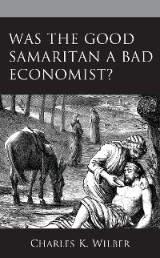Details

Was the Good Samaritan a Bad Economist?
|
44,99 € |
|
| Verlag: | Lexington Books |
| Format: | EPUB, PDF |
| Veröffentl.: | 11.05.2021 |
| ISBN/EAN: | 9781793637017 |
| Sprache: | englisch |
| Anzahl Seiten: | 266 |
DRM-geschütztes eBook, Sie benötigen z.B. Adobe Digital Editions und eine Adobe ID zum Lesen.
Beschreibungen
<p><span> In </span><span>Was the Good Samaritan a Bad Economist?</span><span> Charles K. Wilber argues that the American economy has not only failed to overcome poverty, it has generated extreme inequality that in turn restricts social mobility and further marginalizes the poor. Wilber argues that economic theory is permeated with ethical values and any economics must be so; that human behavior is more complex than the economists’ simple self-interest model; that people are also driven by deeply embedded moral values; that markets require intervention to create equity; and that Catholic social thought provides the perspective and values to develop a more relevant social economics. The author takes that modified economics and uses it to analyze specific social problems: labor markets, poverty, inequality, financial crisis, and development. Wilber next focuses on the important role of families, labor unions, parishes, and small Christian communities, such as the Catholic Worker movement, as mediating institutions in the economy. He concludes with a final look at the questions, "Was the Good Samaritan a Bad Economist?".</span></p>
<p><span>Economics is imbued with individualistic values that result in an economy marked by extreme inequality that in turn restricts social mobility and further marginalizes the poor. Catholic social thought provides the moral values required to help make economics capable of building an economy that serves all, rich and poor alike.</span></p>
<p><span>Part One: Foundations</span></p>
<p><span>1 The Good Samaritan and Catholic Social Thought</span></p>
<p><span>2 Economic Theory Requires Moral Values </span></p>
<p><span>3 Individual Actors Have Moral Values</span></p>
<p><span>4 Markets Require Intervention</span></p>
<p><span>5 Moral Theories and Justice</span></p>
<p><span>6 Catholic Social Thought and the Common Good</span></p>
<p><span>Part Two: Applications</span></p>
<p><span>7 Economics of Labor Markets and Theory of the Gift</span></p>
<p><span>8 The Causes of Poverty</span></p>
<p><span>9 Pope Francis and Inequality</span></p>
<p><span>10 The Economy as a Casino: Ethics and the Global Financial Crisis</span></p>
<p><span>11 Integral Human Development </span></p>
<p><span>Part Three: Whither the Future</span></p>
<p><span>12 The Economy, the Family and Mediating Institutions</span></p>
<p><span>13 Distributism and the Catholic Worker Movement</span></p>
<p><span>14 Wisdom and the Christian Economist </span></p>
<p></p>
<p><span>1 The Good Samaritan and Catholic Social Thought</span></p>
<p><span>2 Economic Theory Requires Moral Values </span></p>
<p><span>3 Individual Actors Have Moral Values</span></p>
<p><span>4 Markets Require Intervention</span></p>
<p><span>5 Moral Theories and Justice</span></p>
<p><span>6 Catholic Social Thought and the Common Good</span></p>
<p><span>Part Two: Applications</span></p>
<p><span>7 Economics of Labor Markets and Theory of the Gift</span></p>
<p><span>8 The Causes of Poverty</span></p>
<p><span>9 Pope Francis and Inequality</span></p>
<p><span>10 The Economy as a Casino: Ethics and the Global Financial Crisis</span></p>
<p><span>11 Integral Human Development </span></p>
<p><span>Part Three: Whither the Future</span></p>
<p><span>12 The Economy, the Family and Mediating Institutions</span></p>
<p><span>13 Distributism and the Catholic Worker Movement</span></p>
<p><span>14 Wisdom and the Christian Economist </span></p>
<p></p>
<p><span>Charles K. Wilber</span><span> is emeritus professor of economics and fellow, Joan B. Kroc Institute for International Peace Studies at the University of Notre Dame.</span></p>

















